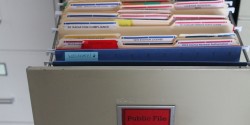On Wednesday, December 11, 2019, Denison University in Granville, Ohio, filed paperwork with the FCC for a proposed assignment of the FM license for its student-run radio station WDUB-FM (aka The Doobie). The sale price is a paltry $5,000 being paid by Ohio State University (WOSU Public Media). Additionally, Denison will be granted underwriting announcements over WOSU TV and radio for 4 years, at an estimated value of $47,040. Paid student internships will also be offered to Denison students ($48,000 value).
This news did not come out of the blue, as WDUB ceased broadcasting over FM back on September 1, 2019 (ironically, just after it was included in Princeton Review’s list of “most popular” college radio stations). In its request with the FCC for special temporary authority to remain silent, Denison University stated that it suspended operation “for financial reasons” and sought permission to “remain silent until such time as it can resolve the situation.”
But, the rationale goes much deeper, as WDUB participants pointed to fears of budget-breaking FCC fines for public file violations being a big motivation for relinquishing the FM signal.
According to an October 15, 2019 piece in the Denisonian:
A big transition happened last year, when the FCC decided to move their documentation system to an online platform rather than physical paperwork. When The Doobie began the process of switching their public file over to abide by FCC, they discovered a problem: about five to six years of missing documents and unsigned papers.
‘With everything that we were looking at, the fine could have been around $60,000,’ [senior station manager and president of the station Rachel] Weaver explains…
‘We had a lot of people telling us to just ‘fudge’ the paperwork, and that is a felony.’ Hiding past mistakes was a risk that was not up for discussion to Weaver. This was the leading decision behind The Doobie switching to an online streaming service.
‘No one wants to kill the radio, and a lot of alumni are upset, because we are losing a bit of nostalgia with this,’ Weaver said.
It’s unfortunate that fear of a big FCC fine led to the station relinquishing its license for a mere $5,000. While public file violations can yield serious fines; student-run radio stations with first-time violations have been able to negotiate deals with the FCC, following a decision in 2013. As a result, we’ve reported on quite a few consent decrees with voluntary forfeitures in the $1,000, $1,200, to $2,200 range. This is a far cry from some of the higher fines wielded against student radio stations in the past and is based on acknowledgment by the FCC of the low-budget and transitory nature of student-run radio stations.
More College Radio News
License Sales
- Ohio State to Buy Denison University’s WDUB College Radio License (All Access)
- The Doobie Undergoes Changes, Including Move to Streaming Service (The Denisonian)
Music Culture
- Podcast #223: Will CMJ Return… (Radio Survivor)
Events
- A Quiet Night of Radio and Relaxation with WGRN (Greenville University Papyrus)
- 2020 IBS Convention Registration is Open (IBS)
Programming
- The Deep-Seated Tradition of Vinyl, Marathon Weeks at WUNH (The New Hampshire)
- Northampton Journalism Students to Broadcast Election Results (Hold the Front Page)
College Radio in Popular Culture
- Dear White People Exclusive Interview Yvette Lee Bowser (Assignment X)
Public Radio Connections
- Public Radio East: Thirty-five Years in the Making (New Bern Sun Journal)
College Radio History
- Day in History 1994: Rochester Community College station KRPR Leaves Minnesota Airwaves (Post Bulletin)
Alumni
- Rhys Gunter to Present Radio 1 Show (Dorset Echo)
- Cornwall DJ who started in his Bedroom to Host Radio 1 Breakfast Show (Cornwall Live)



